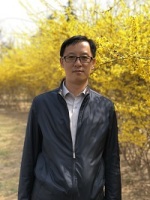个人简介
教育背景 1998/09-2001/07 哈尔滨工业大学,市政工程专业,博士,导师:彭永臻 1996/09-1998/07 哈尔滨建筑大学,水力学与河流水体动力学,硕士,导师:张维佳 1992/09-1996/07 哈尔滨建筑大学,给水排水专业,本科 工作经历 2012/07-至今 北京工业大学,环境与能源工程学院,博士生导师 2010/12-至今 北京工业大学,环境与能源工程学院,教授 2004/01-2010/12 北京工业大学,环境与能源工程学院,副教授 2005/08-2005/11 加拿大UBC和SFU大学,培训与交流 2001/07-2003/12 北京工业大学,环境与能源工程学院,讲师
研究领域
1.污水脱氮除磷技术 2.污泥好氧颗粒化技术 3.环境微生物分子生态学 4.生物吸附(染料废水、重金属废水等) 5.环境催化等
近期论文
 查看导师新发文章
(温馨提示:请注意重名现象,建议点开原文通过作者单位确认)
查看导师新发文章
(温馨提示:请注意重名现象,建议点开原文通过作者单位确认)
1.Pan K-L, Gao J-F*, Li H-Y, Fan X-Y, LiD-C, Jiang H, Ammonia-oxidizing bacteria dominate ammonia oxidation in afull-scale wastewater treatment plant revealed by DNA-based stable isotopeprobing, Bioresource Technology, 2018, 256: 152–159
2.Fan X-Y, Gao J-F*, Pan K-L, Li D-C, Zhang L-F, Wang S-J, Shifts in bacterialcommunity composition and abundance of nitrifiers during aerobic granulation intwo nitrifying sequencing batch reactors, Bioresource Technology, 2018, 251:99–107
3.Fan X-Y, Gao J-F*, Pan K-L, Li D-C, Dai H-H, Temporal dynamics of bacterialcommunities and predicted nitrogen metabolism genes in a full-scale wastewatertreatment plant, Rsc Advances, 2017, 7(89) : 56317-5632
4.Gao J-F*, Fan X-Y, Li H-Y, Pan K-L.Airborne Bacterial Communities of PM2.5 in Beijing-Tianjin-Hebei Megalopolis,China as Revealed By Illumina MiSeq Sequencing: A Case Study. Aerosol and AirQuality Research. 2017;17:788-798.
5.GaoJ-F*, Pan K-L, Li H-Y, Fan X-Y, Sun L-X, Zhang S-J, et al. Application ofGelGreen™ in cesium chloride density gradients for DNA-stable isotope probingexperiments. Plos One. 2017;12(1):e0169554.
6.GaoJ-F*, Si C-Y, Li H-Y. Role of functional groups on protonated de-oiled soybeaninvolved in triclosan biosorption from aqueous solution. RSC Advances.2016;6(71):67319-30.
7.GaoJ-F*, Li H-Y, Pan K-L, Si C-Y. Green synthesis of nanoscale zero-valent ironusing a grape seed extract as a stabilizing agent and the application for quickdecolorization of azo and anthraquinone dyes. RSC Advances. 2016;6:22526 - 37.
8.GaoJ-F*, Li H-Y, Pan K-L, Fan X-Y, Si C-Y. Green synthesis of iron nanoparticlesusing Garcinia mangostana l. pericarp extract and their application fordegradation of anthraquinone dye. Fresenius Environmental Bulletin.2016;25(7):2343-55.
9.GaoJ-F*, Fan X-Y, Wu G-X, Li T, Pan K-L. Changes of abundance and diversity ofammoniaoxidizing archaea (AOA) and bacteria (AOB) in three nitrifyingbioreactors with different ammonia concentrations. Desalination and WaterTreatment. 2016;57(45):21463-75.
10.GaoJ-F*, Fan X-Y, Pan K-L, Li H-Y, Sun L-X. Diversity, abundance and activity ofammonia-oxidizing microorganisms in fine particulate matter. ScientificReports. 2016;6:38785.
11.GaoJ-F*, Fan X-Y, Luo X, Pan K-L. Insight into the short-term effect of titaniumdioxide nanoparticles on active ammonia oxidizing microorganisms in afull-scale wastewater treatment plant: a DNA-stable isotope probing study. RSCAdvances. 2016;6(77):73421-31.
12.GaoJ-F*, Si C-Y, He Y. Application of soybean residue (okara) as a low-costadsorbent for reactive dye removal from aqueous solution. Desalination andWater Treatment. 2015;53(8):2266-77.
13.GaoJ-F*, Luo X, Wu G-X, Li T, Peng Y-Z. Abundance and diversity based on amoAgenes of ammonia-oxidizing archaea and bacteria in ten wastewater treatmentsystems. Appl Microbiol Biot. 2014;98(7):3339-54.
14.GaoJ-F*, Luo X, Wu G-X, Li T, Peng Y-Z. Quantitative analyses of the compositionand abundance of ammonia-oxidizing archaea and ammonia-oxidizing bacteria ineight full-scale biological wastewater treatment plants. Bioresource Technol.2013;138(0):285-96.
15.He Y,Gao J-F*, Feng F-Q, Liu C, Peng Y-Z, Wang S-Y. The comparative study on therapid decolorization of azo, anthraquinone and triphenylmethane dyes byzero-valent iron. Chemical Engineering Journal. 2012;179:8-18.(封面论文,ESI高被引)
16.GaoJ-F*, Zhang Q, Wang J-H, Wu X-L, Wang S-Y, Peng Y-Z. Contributions offunctional groups and extracellular polymeric substances on the biosorption ofdyes by aerobic granules. Bioresource Technol. 2011;102(2):805-13.
17.GaoJ-F*, Wang J-H, Yuan Q, Yang C, Wang S-Y, Peng Y-Z. Utilization of agriculturalwaste chestnut shell for the removal of Reactive Brilliant Red K-2G from aqueoussolution. Desalination and Water Treatment. 2011;36(1-3):141-51.
18.GaoJ-F*, Wang J-H, Yang C, Wang S-Y, Peng Y-Z. Binary biosorption of Acid Red 14and Reactive Red 15 onto acid treated okara: Simultaneous spectrophotometricdetermination of two dyes using partial least squares regression. ChemicalEngineering Journal. 2011;171(3):967-75.
19.GaoJ-F*, Wang J-H, Wu X-L, Zhang Q, Peng Y-Z. Protonated spent mushroom substrateas a potential low-cost biosorbent for the removal of Reactive Red 15 fromaqueous solutions. Fresenius Environmental Bulletin. 2011;20(1):51-62.
20.17.Gao J-F*, Zhang Q, Su K, Wang J-H. Competitivebiosorption of Yellow 2G and Reactive Brilliant Red K-2G onto inactive aerobicgranules: Simultaneous determination of two dyes by first-order derivativespectrophotometry and isotherm studies. Bioresource Technol.2010;101(15):5793-801.


